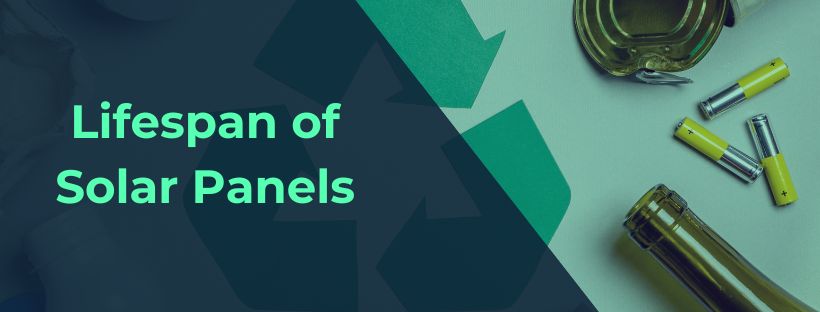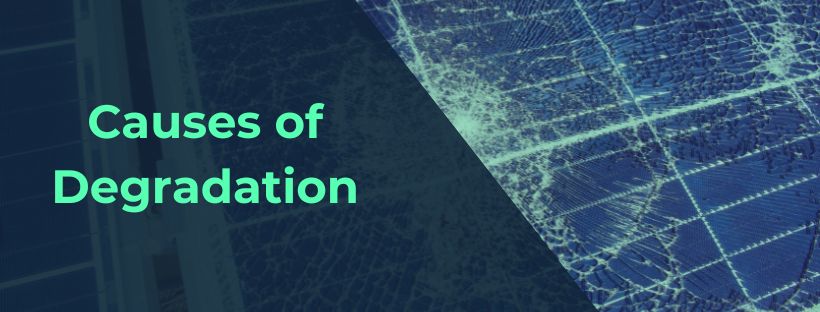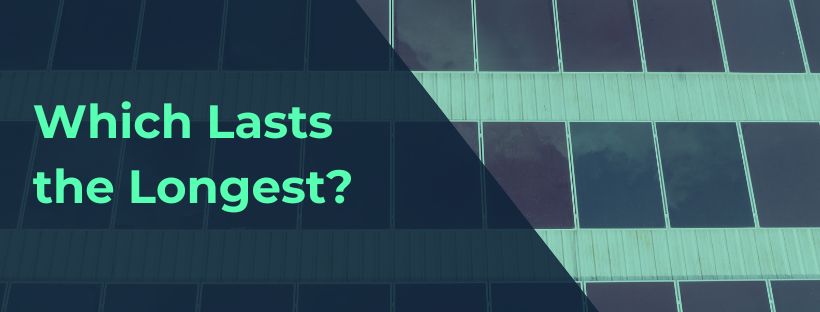
The Causes of DegradationWhat is the life expectancy of solar panels in the UK?Which type of solar panel lasts the longest?What's the average solar panel warranty?How can you make your solar panels last longer?Should you get solar panel insurance?How should you dispose of disused solar panels?Find a local installerNext stepsFrequently Asked Questions
The Causes of DegradationWhat is the life expectancy of solar panels in the UK?Which type of solar panel lasts the longest?What's the average solar panel warranty?How can you make your solar panels last longer?Should you get solar panel insurance?How should you dispose of disused solar panels?Find a local installerNext stepsFrequently Asked Questions

You're likely pondering, "How long do solar panels actually last?"
It's a valid question, especially with the nation's growing commitment to green energy. Solar panels have become a staple in renewable energy, boasting an impressive 18% growth rate from 2018 to 2023. But beyond their popularity, it's crucial to understand the longevity of these investments.
This article will guide you through the expected lifespan of solar panels in the UK, shedding light on their durability and efficiency over time.
Degradation refers to the slow decline in the output of a solar panel over time due to various factors, including exposure to the elements, wear and tear, and the quality of the panel itself. Below is a concise breakdown of degradation rates and how they affect longevity:
| Factor | Detail |
|---|---|
| Average Lifespan | 25-30 years |
| Degradation Rate | 0.2% - 0.5% annually |
| Post-30 years Efficiency | Continues to generate energy but at a reduced efficiency |
| Influencing Factors | Panel quality, maintenance, climate |
| Long-term Outlook | High durability with proper care, promising a significant period of energy generation |
You can anticipate the operational efficacy of your solar panels and plan for their long-term use, ensuring a stable, greener energy solution for your home.

Let's explore the principal factors contributing to solar panel degradation, which can significantly impact their performance in the UK’s distinct climate.
A natural response of crystalline silicon cells to sunlight, LID initiates an interaction that slightly reduces efficiency right from the start.
DLID results from direct sunlight exposure during the initial setup and can cause structural stress within the cells.
The formation of boron dioxide on the panel surface directly affects its efficiency by altering the silicon structure.
Voltage differences within the solar panel components can lead to electricity leakage, thereby reducing overall panel efficacy.
External conditions such as weather and temperature fluctuations contribute to physical wear and, consequently, efficiency loss over time.
While some degradation is inevitable, understanding these causes helps in taking preventive measures to ensure your solar panels last as long as possible in the challenging UK climate.

The consensus among industry experts is quite promising. Generally, solar panels are designed to withstand the tests of time and the UK’s diverse weather conditions, offering a significant period of efficient energy production.
The industry standard warranty provides a 25 to 30-year guarantee at around 80% efficiency, but this doesn't mean your panels stop functioning after this period. Many solar panels continue to operate efficiently well beyond their warranty, though at a gradually reduced capacity.
Here's a closer look at the typical lifespan you can expect from solar panels in the UK, backed by statistics.
| Factor | Details |
|---|---|
| Average Lifespan | 25-30 years, with potential to exceed depending on maintenance and environmental conditions. |
| Efficiency Loss | About 0.5-1% per year, meaning after 25 years, panels maintain roughly 80-85% of their initial output. |
| Warranty Period | Most manufacturers guarantee 80% performance up to 25-30 years. |
| Beyond Warranty | Panels can continue operating post-warranty, though at reduced efficiency. |
| Maintenance | Regular cleaning and checks can extend lifespan and efficiency. |
| Environmental Impact | UK's climate considered, with potential for faster degradation in highly industrial or coastal areas. |
Maximising your solar panels' lifespan lies in understanding these expected timelines and ensuring regular maintenance and care.

Each type of solar panel, from monocrystalline to polycrystalline and thin-film, boasts different lifespans influenced by their manufacturing processes and materials. Read on for a brief comparative analysis detailing the expected durability of each panel type:
| Solar Panel Type | Average Lifespan | Key Features |
|---|---|---|
| Monocrystalline | Up to 40 years | Made from a single silicon crystal, these panels offer high efficiency and have fewer potential failure points. Their durability is the highest among the types, making them a preferred choice despite their higher cost. |
| Polycrystalline | Up to 35 years | Constructed from multiple silicon crystals, polycrystalline panels are slightly less durable than their monocrystalline counterparts. They offer a balance of performance and cost, suitable for those looking for an economical option without significantly compromising on lifespan. |
| Thin-Film | Varies | Thin-film panels are known for their flexibility and lower cost of production. However, their lifespan is generally shorter than crystalline solar panels due to the materials and technology used. They are ideal for specific applications where traditional panels are not feasible. |
Solar panel warranties come in a variety of lengths and coverages, typically reflecting the quality and anticipated lifespan of the panel. Most top-quality panels boast an industry-standard 25-year warranty. However, the depth of coverage within these warranties can vary significantly.
Here’s what you can expect from solar panel warranties:
| Warranty Type | Coverage | Duration |
|---|---|---|
| Product Warranty | Covers defects in the solar panels themselves, not related to wear and tear. | 10 to 25 years |
| Performance Warranty | Assures that the panels will produce a certain percentage of their rated power output. Common guarantees are at least 80% performance at 25 years. | Up to 25 years |
| Installation Warranty | Provided by the installer, covering issues related to installation workmanship. | Typically 1 to 10 years |
It's essential to read the fine print of your solar panel warranty. The product warranty protects you from manufacturing defects, ensuring you won't be left out of pocket if your panels fail prematurely. The performance warranty is particularly noteworthy, as it guarantees a minimum output level, offering a clear indication of the expected degradation rate over time. Lastly, the installation warranty, while often shorter, safeguards against issues arising from the installation process.
Manufacturers might offer extended warranties for an additional cost, which could be worth considering for long-term security. Always verify that your installer is certified and that the panels you're purchasing meet industry standards to ensure you're fully covered by these warranties.
Solar panels in the UK reach or even exceed their expected lifespan involves a mix of regular maintenance, understanding of product choices, and the initial setup. Following a strategic approach can help in maximising their longevity.
Quality can significantly impact solar panel lifespan. High-quality solar panels made with quality materials show less degradation over time. Let's have a quick look at the expected lifespan based on panel type:
| Panel Type | Expected Lifespan |
|---|---|
| Monocrystalline | Up to 40 years |
| Polycrystalline | Up to 35 years |
| Thin-film | Less compared to mono and polycrystalline |
Keeping your solar panels clean and well-maintained is paramount. Annual inspections by qualified technicians can identify potential issues early. Additionally, keeping panels free of debris and dirt can prevent damage and ensure optimal performance.
Proper installation by trained professionals can prevent a multitude of issues down the line. Poorly installed panels may face problems such as water leaks and structural issues, which can significantly impact their efficiency and lifespan.
| Maintenance Task | Impact |
|---|---|
| Annual Inspections | Detects early signs of wear or damage |
| Cleaning | Prevents performance drop due to dirt accumulation |
| Professional Installation Check | Ensures optimal setup and minimises risk of damage |
Given the longevity of solar panels, with monocrystalline panels potentially serving you well for up to 40 years, it's wise to consider how to protect your investment. Insurance for solar panels might not be the first thing on your mind following the excitement of installation and the anticipation of savings on energy bills. However, understanding the nuances of solar panel insurance is crucial for safeguarding your panels through their long service life.
Insurance not only offers peace of mind but can also provides financial protection against risks that could affect your panels' performance and durability.
| Aspect | Details |
|---|---|
| Annual Cost in the UK | £118 - £152 |
| Coverage Includes | Damage from natural disasters (fire, hail, lightning, storms), theft, loss of income due to power generation outage, liability for injuries/property damage |
| Key Exclusions | Normal wear and tear, manufacturing defects, damage caused by improper installation, accidental damage (unless additional coverage is chosen) |
| Importance of Notification | Essential to inform your insurer upon solar panel installation to adjust home value and cover |
The annual cost range appears reasonable, especially when considering the potential financial loss from theft or natural disaster damage. The comprehensive nature of typical policies, covering everything from theft to income loss, aligns well with the risks these investments face. Yet, the exclusions highlight the necessity of preventive actions like ensuring proper installation and considering additional coverage for accidental damage.
However, note the inverter, a critical component of your solar panel system, may not be covered under standard policies. Given its shorter lifespan compared to panels and the replacement cost involved, this is an important consideration.
Given the significant investment in solar panel systems and the potential risks over their extensive service life, securing solar panel insurance seems a prudent decision. It complements your efforts to extend the lifespan and efficiency of your panels while protecting against unforeseen events.
When your solar panels in the UK have reached the end of their life or are no longer functioning at optimal efficiency, it's time to consider the environmental impact of disposing of them. Unlike regular waste, solar panels require specific disposal methods due to the materials and components they contain. Here's what you need to know about responsibly disposing of disused solar panels.
In the EU, solar panels are classified as e-waste under the Waste Electrical and Electronic Equipment (WEEE) Directive, which mandates recycling and proper disposal practices. While the UK has left the EU, it still follows similar guidelines for e-waste management, ensuring that solar panel disposal adheres to environmental preservation standards.
Two main solar panel types, silicon-based and thin-film-based, have different recycling approaches. Here's a quick breakdown:
| Type | Process | Efficiency |
|---|---|---|
| Silicon-based | Disassembly, thermal processing, physical separation | Up to 85% |
| Thin-film-based | Shredding, hammermill, separation | Over 90% |
Silicon-based panels see components like glass and aluminium almost entirely reused, while thin-film technologies undergo more thorough processing to separate materials. Both processes aim to salvage valuable materials for reuse, significantly reducing environmental impact.
Locating a facility that accepts solar panels for recycling is your next step. The Solar Trade Association or local waste management authorities can provide information on approved e-waste recyclers. It's essential to choose a certified recycler to ensure your panels are disposed of responsibly, aligning with both UK and international standards.
With the insights into degradation and disposal, you understand the importance of choosing an installer who not only delivers quality service but also guides you in maintaining your solar panels for their maximum lifespan and advises on eventual recycling.
Finding the right local installer could seem daunting, but assistance is closer than you think. A quick, efficient way to connect with professional installers in your area is through a streamlined process that requires less than a minute of your time. By filling out a simple 30-second form, you can request solar panel quotes from up to four local engineers. This not only saves you hours of research but also empowers you to make an informed decision by comparing these quotes side by side.
| Criteria | What to Look For |
|---|---|
| Experience | Installers with a track record of successful installations, particularly in the UK’s unique climate. |
| Certifications | Engineers who are certified under recognised schemes, ensuring quality and safety standards are met. |
| Quotes | Competitive pricing that includes not just installation but potential financing options and warranties. |
| Warranty and Aftercare | Clarity on warranty lengths and what they cover, plus offerings of regular maintenance checks. |
| Environmental Compliance | Professionals who can advise on environmentally responsible disposal and recycling of old panels. |
After considering the longevity of solar panels in the UK and understanding the significance of professional installation and legal disposal, you might wonder what the immediate next steps should be to ensure you get the most out of your solar panel investment.
Here are some actionable steps that you can take today:
Thoroughly researching local solar panel installers. Look for those with experience, essential certifications, and positive customer feedback.
| Criteria | Why It Matters |
|---|---|
| Experience | More years mean more reliability and knowledge. |
| Certifications | Proof of skill and industry compliance. |
| Customer Reviews | Real-world feedback on performance and service. |
| Warranty offered | Assurance of product longevity and service quality. |
Don’t settle for the first quote. Comparing different offers ensures you find the best blend of quality and cost-efficiency.
| Done By | Expected Outcome |
|---|---|
| Acquiring Multiple Quotes | Ensures competitive pricing and options. |
Regular check-ups by a professional can identify potential issues before they escalate, significantly extending the useful life of your panels.
| Frequency | Benefit |
|---|---|
| Every Few Years | Maintains optimal function and efficiency. |
Adopting a simple, effective cleaning routine is crucial for maximising efficiency and lifespan. Use the guidelines provided earlier for the best practices.
| Seasonal Adjustment | Recommended Action |
|---|---|
| In Dry Periods | Increase cleaning frequency to three times a year. |